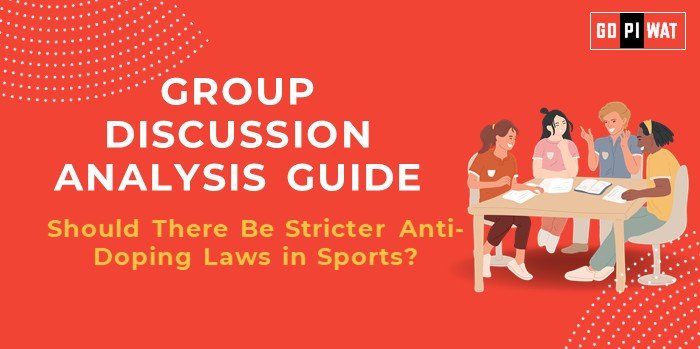📋 Group Discussion Analysis Guide: Should There Be Stricter Anti-Doping Laws in Sports?
🌐 Introduction to Anti-Doping in Sports
- 💡 Opening Context: The integrity of sports is a global concern, with anti-doping measures critical to ensuring fairness and equality among athletes. Recent scandals involving high-profile athletes have reignited the debate on whether current regulations are adequate.
- 📜 Topic Background: Anti-doping laws have evolved over decades, spearheaded by organizations like the World Anti-Doping Agency (WADA), established in 1999. Despite advancements, loopholes and inconsistent enforcement remain significant hurdles.
📊 Quick Facts and Key Statistics
• 🧪 Positive Drug Tests: Over 1,700 adverse findings reported annually by WADA laboratories (2023).
• ⚖️ Countries with Strict Laws: Russia, China, and Italy impose stringent penalties, including criminal charges.
• 💸 Economic Impact: Doping scandals cost sports leagues millions in lost sponsorships and reputational damage.
• 📈 Public Sentiment: A 2023 survey revealed 78% of fans support harsher penalties for doping offenses.
• ⚖️ Countries with Strict Laws: Russia, China, and Italy impose stringent penalties, including criminal charges.
• 💸 Economic Impact: Doping scandals cost sports leagues millions in lost sponsorships and reputational damage.
• 📈 Public Sentiment: A 2023 survey revealed 78% of fans support harsher penalties for doping offenses.
🤝 Stakeholders and Their Roles
- 🏋️ Athletes: Directly impacted by regulations; pressure to perform increases the temptation to dope.
- 🏢 Sports Federations: Implement testing and penalize offenders but face resource limitations.
- 🌐 WADA: Sets global standards, monitors compliance, and accredits laboratories.
- 🏛️ Governments: Support enforcement and introduce national legislation against doping.
- 👨👩👧👦 Fans & Sponsors: Influence the perception of fairness and integrity in sports.
🏆 Achievements and Challenges
✨ Achievements:
- 📜 Biological Passport: Reduced doping cases in cycling by 30% over the past decade.
- 🌍 WADA Code: Adopted by 200+ countries, ensuring global standardization.
- 🤖 Technological Advances: AI in detecting doping patterns has increased testing efficiency.
⚠️ Challenges:
- ⚖️ Inconsistent Enforcement: National policies vary, undermining global efforts.
- 🔍 Legal Loopholes: Lack of penalties in some countries creates havens for offenders.
- 🧬 Evasion Tactics: Micro-dosing and designer drugs evade current detection methods.
🌍 Global Comparisons:
- 🇳🇴 Success: Norway’s zero-tolerance policy combined with education programs has minimized doping cases.
- 🇷🇺 Failures: The Russian doping scandal exposed systemic flaws in enforcement.
🔍 Structured Arguments for Discussion
- ✅ Supporting Stance: “Stricter laws will deter potential offenders and ensure a level playing field.”
- Mandatory criminal penalties for doping can act as a strong deterrent.
- ❌ Opposing Stance: “Overregulation might lead to false positives, damaging innocent athletes’ careers.”
- Stricter laws could lead to unjust bans and legal challenges, harming the sport’s reputation.
- ⚖️ Balanced Perspective: “While stricter laws are necessary, comprehensive education and fair enforcement are equally vital.”
- A balanced approach integrates harsher penalties with preventive education to ensure long-term integrity.
💡 Effective Discussion Approaches
🔑 Opening Approaches:
- 📊 Statistical Impact: “With over 1,700 doping cases annually, it’s clear existing laws lack teeth.”
- ⚖️ Ethical Angle: “Doping compromises the essence of fair competition, necessitating stricter laws.”
- 🌍 Global Example: “Norway’s zero-tolerance approach demonstrates the efficacy of stringent enforcement.”
🤝 Counter-Argument Handling:
- ✔️ Rebuttal: “While there’s concern about false positives, advanced testing methods reduce such risks.”
📈 Strategic Analysis of Strengths and Weaknesses
- ✔️ Strengths: Global WADA framework, increased public awareness.
- ❌ Weaknesses: Implementation disparities, insufficient funding.
- 🚀 Opportunities: AI for detection, collaborative international efforts.
- ⚠️ Threats: Legal pushback, sophisticated evasion techniques.
🏫 Connecting with B-School Applications
- 📚 Real-World Applications:
- Ethics and governance in sports management.
- Policy-making and cross-border enforcement strategies.
- 🎓 Sample Interview Questions:
- 🤔 “How can stricter doping laws enhance global sports governance?”
- 📋 “What role do ethics play in ensuring a fair sporting ecosystem?”
- 📘 Insights for Students:
- Explore the intersection of ethics, economics, and policy development in sports.
- Analyze the long-term impact of doping laws on global sports competitiveness.
📄 Source: Compiled Analysis, 2024


